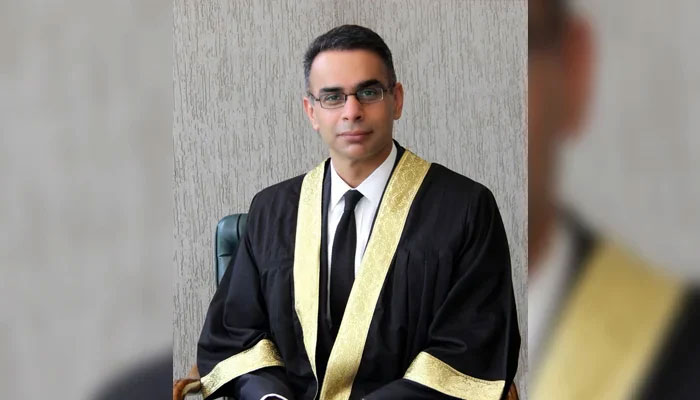Does law allow surveillance, secret recordings of citizens, asks IHC
IHC issues order on ex-CJP Saqib Nisar's son's plea; also questions if govt was empowered under law to record citizen's phone calls
ISLAMABAD: A day after the Islamabad High Court (IHC) asked the government to inform it about the elements responsible for recording audios, Justice Babar Sattar issued a notice to the secretary of the National Assembly, raising a number of questions, including whether the law permitted surveillance and secret recordings of citizens. The seven-page-long order sheet was issued by Justice Babar in response to a petition filed by Najam Saqib, son of ex-CJP Nisar, against a special committee formed by the National Assembly Speaker Raja Pervaiz Ashraf to probe audio clips allegedly featuring his voice.
Najam, in his plea, had submitted that the proceedings of the Aslam Bhootani-led NA special committee be stopped.
Subsequently, the IHC stayed the NA committee, demanding, instead, to know the “elements” behind the leaks. Now, in its detailed order, the federal capital’s top court has asked the NA to answer five questions pertaining to the matter. These questions range from parliament’s authority to inquire into acts of private citizens to which agency is permitted to record calls of private citizens.
The order also asks the NA secretary to inform the court, which public authority or agency will be held liable for such surveillance if it is discovered that there were no legal grounds for such recording.
The questions are:1. Is parliament vested with legal authority to inquire into and investigate acts of private citizens who hold no public office or whether assuming such power intrudes into the domain of the executive?
2. Does the Constitution and the rules framed under it to regulate parliamentary procedure vest in the office of the speaker National Assembly the authority to constitute a special committee to investigate actions attributable to a private citizen who is not a member of parliament or a public officeholder?
3. Does the Constitution or statutory law empower the executive, and in the present case the federal government, to record or surveil phone calls or telecommunication between private citizens, and if so the supervisory and regulatory legal regime within which such recording and surveillance can take place?
4. To the extent that recording of phone calls is permitted, which public authority or agency is authorized to do so, how is the right of a citizen to liberty and privacy to be balanced against the interest of the State in recording phone calls or undertaking surveillance and which agency is vested with legal authority to undertake such balancing exercise? and
5. In the event that there is no legal sanction to tap phones, record telecommunication between citizens or undertake surveillance, which public authority or agency is to be held liable for such surveillance and encroachment over the right of citizens to liberty and privacy and/or release of illegally recorded private conversations to the public?
-
 Jessica Alba, Cash Warren Finalize Divorce After 16 Years Of Marriage
Jessica Alba, Cash Warren Finalize Divorce After 16 Years Of Marriage -
 China’s AI Boom Takes Center Stage At Spring Festival One Year After DeepSeek Stirred The Industry
China’s AI Boom Takes Center Stage At Spring Festival One Year After DeepSeek Stirred The Industry -
 James Van Der Beek Called His Sixth Child Jeremiah 'healing For Us' Before His Death
James Van Der Beek Called His Sixth Child Jeremiah 'healing For Us' Before His Death -
 Elon Musk Vs Reid Hoffman: Epstein Files Fuel Public Spat Between Tech Billionaires
Elon Musk Vs Reid Hoffman: Epstein Files Fuel Public Spat Between Tech Billionaires -
 Gordon Ramsay Denies Victoria Beckham Got Handsy With Brooklyn At His Wedding
Gordon Ramsay Denies Victoria Beckham Got Handsy With Brooklyn At His Wedding -
 Gordon Ramsay Makes Unexpected Plea To Brooklyn As He Addresses Beckham Family Feud
Gordon Ramsay Makes Unexpected Plea To Brooklyn As He Addresses Beckham Family Feud -
 Prince Harry Warns Meghan Markle To 'step Back'
Prince Harry Warns Meghan Markle To 'step Back' -
 Selena Gomez Explains Why She Thought Lupus Was 'life-or-death'
Selena Gomez Explains Why She Thought Lupus Was 'life-or-death' -
 New Zealand Flood Crisis: State Of Emergency Declared As North Island Braces For More Storms
New Zealand Flood Crisis: State Of Emergency Declared As North Island Braces For More Storms -
 Nancy Guthrie Case: Mystery Deepens As Unknown DNA Found At Property
Nancy Guthrie Case: Mystery Deepens As Unknown DNA Found At Property -
 James Van Der Beek's Brother Breaks Silence On Actor's Tragic Death
James Van Der Beek's Brother Breaks Silence On Actor's Tragic Death -
 Megan Thee Stallion On New Romance With Klay Thompson: 'I'm Comfy'
Megan Thee Stallion On New Romance With Klay Thompson: 'I'm Comfy' -
 Nicole Kidman Celebrates Galentine’s Day Months After Keith Urban Split
Nicole Kidman Celebrates Galentine’s Day Months After Keith Urban Split -
 Justin Bieber Unveils Hailey Bieber As First Face Of SKYLRK In Intimate Campaign Debut
Justin Bieber Unveils Hailey Bieber As First Face Of SKYLRK In Intimate Campaign Debut -
 Caitlin O’Connor Says Fiance Joe Manganiello Has Changed Valentine’s Day For Her
Caitlin O’Connor Says Fiance Joe Manganiello Has Changed Valentine’s Day For Her -
 Rachel Zoe Sends Out Message For Womne With Her Post-divorce Diamond Ring
Rachel Zoe Sends Out Message For Womne With Her Post-divorce Diamond Ring




